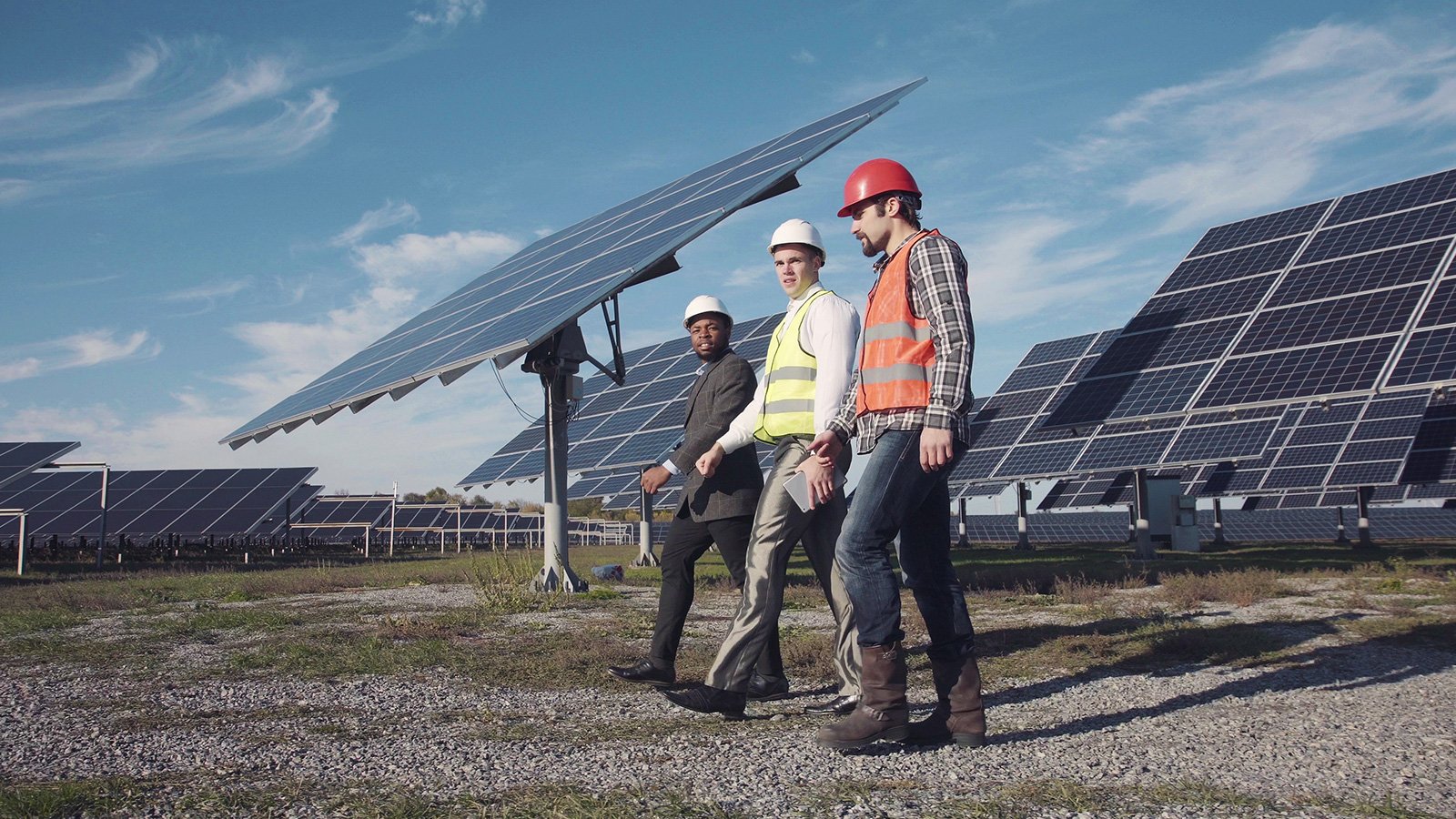This story features Bob Goldstein, co-founder and managing director of First Woodland, LLC, a U.S. national company specializing in matching commercial, industrial and institutional solar projects with financial opportunities. Connect with Bob on EnergyBin to discuss how First Woodland can add value to your company.
Large-scale solar development is all about collaboration. It takes many partners to carry out a project. In a relationship-oriented industry, having the right partners is key to completing a quality project. From developers to EPCs to distributors and financiers, moving a project from inception to completion while guaranteeing optimal power output and profit earnings for years to come requires synergy among all partners involved.
That’s how Bob Goldstein, co-founder and managing director of First Woodland, LLC, brings value to the table.
“We are matchmakers who connect solar developers and EPCs with financiers and funds who are interested in acquiring portfolios of commercial, industrial and institutional solar projects.”
First Woodland was founded in 2019 and is backed by years of experience in the commercial development and renewables sectors. Bob became interested in renewable energy early in his adult life when he attempted to put a windmill on his property. He was a few years out of college.
Since then, Bob has worked as a licensed insurance broker providing surety bonds to clients nationwide for all kinds of renewable energy projects, including ocean currents, hydrogen, solar and storage.
“Being able to contribute to clean air and water is very rewarding, and I’m excited about how my company is evolving the services we offer.”
A stable, credible network of financiers and funds
As matchmakers, First Woodland consultants represent a robust network of financiers and funds. Solar project developers and EPCs source a project from a landowner, a commercial business and building operator, or an industrial or institutional power consumer who wishes to replace their current fossil fuel-based consumption with solar energy. The commercial power consumer chooses not to own and capitalize their solar project. Rather, they look to lease the energy from an independent power provider for 20-25 years at a guaranteed reduced long-term cost compared to what they pay the grid today.
First Woodland’s network of solar financiers seek to finance projects to purchase for their own long-term investment inventories. They work with developers and EPCs who locate project opportunities with non-profits, private commercial and institutional entities, including schools, local, county, state and federal government agencies as well as GSA and military properties for their buildings.
The developer or EPC overseeing the project is looking for the financing of a PPA lease or lease purchase arrangement. Their profits are derived from developing and building out the project to the commercial operations date (COD). In some cases, the project is retained by the fund to operate and maintain for future years on the fund’s behalf. If a community solar project is being developed, the fund will usually recommend a preferred, experienced vendor to perform subscription management functions of the project.
“We tend to work on projects ranging from 500 kW to 50 MW. But we’re also open to working with smaller commercial partners attempting to grow their business scale and need us to assist them with larger kW/MW opportunities they are currently sourcing. Most of our clients are overseeing projects that are 1 MW or larger.”
First Woodland’s solar financial network is stable, credible and experienced. Financiers and funds enter into contracts with their own money. Most have long-standing track records and are looking for sound opportunities with serious participants who are not just speculating but wish to move ahead with a vetted project.
“I’m often asked what advice I have for choosing the right financing partner. I tell developers and EPCs if you’re happy and comfortable with what you hear about their intentions, their process and how they treat you, then they’re the right partner. But if you don’t feel good about them, jettison them early on. Once you’ve accepted an offer, and the fund spends a lot of time and money on the project, you are then committed to finishing it. Be sure to do your due diligence upfront.”
When Bob works with a developer or EPC, his role is to pre-underwrite and review the proposed case. He seeks to ensure that whatever stage the project is in, whether at the beginning or beyond, it is thoroughly evaluated and suitable for a financial match.
“First Woodland presents the intake information to the fund seeking a prompt formal offer. They present the offer to the developer or EPC who brought the project in. If it is acceptable, First Woodland introduces the fund and starts the due diligence process. When both parties commit to the project and proper site control is in place, the appropriate premises leases, PPA and EPC agreements are signed.”
First Woodland offers this service at no charge to developers and EPCs. Rather, the company is paid by the financier or fund once a match has been made and the partners consummate the project.
PPAs and surety bonds make an ideal match
Power Purchase Agreements (PPAs) are common, and demand is expected to grow. According to IHS Markit, corporate-driven PPAs are estimated to comprise 20% of total utility-scale projects from 2021 to 2030, which amounts to an average of 4.4 to 7.2 GW per year.
“PPAs are attractive to commercial, industrial and institutional entities because they create the opportunity for solar development without requiring these entities to cough up the capital.”
Bob tends to witness average consumer energy savings of 10-15% under PPAs. These savings may open the door for additional enhancement opportunities, such as roof replacements, solar water heating, solar carports, EV charging stations, storage, etc. A better quality proposal package that improves energy efficiency enhances the PPA program for the off-taker. This process increases the profit margin for the developer/EPC as well as increases the earning potential for the financial partner.
“The PPA offers a symmetry of positive energy. At First Woodland, we act as the intermediary consultant for all three parties with the goal of achieving the objectives usually agreed upon by all parties maximizing the proposal.”
Another important and oftentimes necessary component of a project proposal is surety bonding. Many utilities require bonds for interconnection to the grid. Surety bonds also make projects more appealing to financial partners because they guarantee the faithful performance of each party’s role. First Woodland’s sister company, Unique Surety and Insurance Services, LLC, provides a value-added service to clients.
“Our background in providing developers and EPCs with surety bonds, such as performance, payment, interconnection and decommissioning bonds, has strengthened our experience in all phases of a variety of medium and large solar projects.”
Bob and his colleagues have the power of attorney to write bonds for fourteen major companies that are listed on Circular 570 of the U.S. Department of the Treasury and are licensed to provide surety bonding for projects nationwide.
Partnership opportunities for solar suppliers
Networking is a critical element of First Woodland’s success, which is why Bob decided to join EnergyBin. He is proud to belong to a network whose members seek to advance solar throughout the world and wants EnergyBin members to know First Woodland is here to help.
“We are here as advisors to distributors, wholesalers and equipment brokers to assist with your clients’ project needs. We know what projects that funds and financiers are interested in supporting.”
EnergyBin members who sell new and used solar equipment and whose clients are developers and EPCs interested in financing options may want to consider working with First Woodland.
The company offers an honorarium to suppliers for making an introduction to a client who proceeds with a financing deal. Neither the supplier nor their client pays for First Woodland’s services. Rather, the company is paid by the financing party.
Such a partnership is a win-win-win relationship. The supplier has another value-added service to offer to their clients. A distributor’s clients (developers and EPCs) benefit from experienced advice and accessible funding solutions. First Woodland’s goal is to successfully accomplish matches for developers and EPCs to the benefit of their commercial power consumers and to the satisfaction of the funds that also choose to participate.
“We have connected to a number of distributors on EnergyBin with whom we’ve entered into non-disclosure agreements. EnergyBin is the best intra-communications network for the solar industry. We’re looking forward to partnering with more members to become a valued resource for them whenever we can be of service.”
To learn more, connect with Bob on EnergyBin today.
A special thanks...
To Bob Goldstein for sharing how First Woodland provides financial opportunities for developers, EPCs and suppliers.
More Resources
 The Ultimate Guide to Buying Wholesale Solar Equipment
The Ultimate Guide to Buying Wholesale Solar Equipment
 3 Economic Drivers that Make Viable Today's Solar Secondary Market
3 Economic Drivers that Make Viable Today's Solar Secondary Market


 The Ultimate Guide to Selling Wholesale Solar Equipment
The Ultimate Guide to Selling Wholesale Solar Equipment